
After Kindergarten, our children will get:
Age 6
Physical
• Burst with energy, always on the go, overtires easily
• Loses baby teeth, molars erupt
• Can skip, hop, ride a bike easily; tie shoes; jump rope
• Growth slackens at age 6; needs 11 to 12 hours sleep at night
• Boisterous; like to wrestle but doesn’t know when to stop
• Demonstrates more activity than actual accomplishment
• Is awkward at some fine-motor tasks but very interested in manipulating
• Is self-conscious about work being done often tries too hard
Intellectual
• Likes to work, especially likes to begin something new, but often gets confused and needs help and praise to finish
• Not ready for purely formal abstract instruction in reading, writing, and mathematics
• Works best through creative activity, life experiences, and hands-on learning
• Can do simple math with concrete objects and learns to read and write
• Interested in reading, likes to recognize words and enjoys printing letters
• The span of concentration is still short
• Creates stories, does projects, searches, and art at the PC; uses the computer to support the school curriculum
Social
• Can play with one playmate best; inconsistent with relationships
• May find it hard to fit into the group; daydreaming is common
• Likes social routines that provide a sense of security; plays with both sexes, though beginning to prefer the same gender
• Needs guidance in deciding what to do in school but often responds slowly and negatively to direct demands; very sensitive to criticism
• Cannot distinguish between good and bad clearly; still needs much practice in critical thinking skills
Emotional
• Not moderate; does nothing by halves, demonstrates much emotional intensity
• Wants to cooperate, but at times wants own way and is often bossy
• Success and a sense of achievement are of utmost importance
• Always wants to win and be the first; begins to like rules, especially for others
• Needs to feel loved, wants much attention
• Feels guilty about own negative feelings
• Jealous of anyone becoming between him or her mother
• Unable to easily consider compromises
• Takes criticism badly; thrives on praise; is possessive
• Lives intensely in the present and might worry about problems in the family
• Begins to understand and accept the reality
• Dramatic play and block play help to organize thoughts and feelings
• Has an inner-self, which he or she keeps secret and in which grievances are hidden
• Has nightmares about wild animals, darkness, fire, thunder, monsters, lightning, etc.



